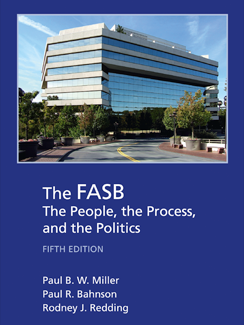- Welcome!
- Log In
- No products in the cart.
Book Detail
FASB: the People, the Process, and the Politics – PDF
$9.99
Explains and assesses FASB’s social mission as well as its structure, procedures, conceptual framework, successes, shortcomings, and future.
Description
by Paul B.W. Miller, Paul R. Bahnson and Rodney J. Redding, ISBN-10: 1-905941-27-7
ISBN-13: 978-1-905941-27-8
Cloth, 288 pages, List price: $24.99
For Special Bulk/Volume Order Discounts phone 330-722-2541.
Description: Paul Miller and Paul Bahnson, acclaimed writers of the long-running “Spirit of Accounting” op-ed column in Accounting Today, have accomplished a complete makeover of FASB: the People, the Process, and the Politics that forthrightly explains and assesses FASB’s social mission as well as its structure, procedures, conceptual framework, successes, shortcomings, and future. These veteran educators with first-hand experience at FASB and the SEC have produced a highly readable book for students of all kinds. Full of information that is overlooked by standard accounting and finance textbooks, this volume is packed with information so essential to their education and future success. The authors’ insights should revolutionize how analysts, executives, regulators and journalist deal with financial statements. Their explanations of how politics shape financial reporting support their persuasive arguments for providing innovative information to the capital markets while also proving that international standards are both infeasible and undesirable.
CLICK HERE TO DOWNLOAD THE FOLLOWING:
A Glimpse into This Book/Preface
Table of Contents
List of Exhibits xvi
List of “On the Side” Comments xvii
List of “The Spirit of Accounting” Columns xviii
Forewords xix
Prologue xxv
Chapter 1 Financial Accounting and the FASB 1
What is financial accounting, and why is it important? 2
What groups are most interested in financial accounting 8
and what are their interests?
Why should differences among these groups be resolved? 11
What is FASB’s basic structure? 13
How does FASB obtain its authority? 15
What procedures does FASB follow in setting standards? 21
Is FASB a political institution? 22
Chapter 2 The FASB’s People and its Structure 31
The Financial Accounting Foundation 31
The Financial Accounting Standards Board 39
The Financial Accounting Standards Advisory Council 43
The FASB staff 44
Appendix—FASB’s Predecessors 49
Chapter 3 The FASB’s Due Process 53
Pronouncements issued by FASB 54
The role of advisory groups in FASB’s deliberations 62
The steps in FASB’s due process 65
FASB’s public relations activities 72
Participating in FASB’s due process 74
Obtaining FASB publications 75
Chapter 4 The FASB’s Conceptual Framework Project 77
Why a conceptual framework can be useful 77
The gap between a prescriptive theory and a conceptual 84
framework
FASB’s experience 87
Overview of FASB’s conceptual framework 89
Concepts statements 91
More about our asset/liability theory 116
The next steps 122
A closing thought 124
Chapter 5 Some Recurring Accounting Controversies 125
Issues and paradigms 126
The issues 131
Capitalization versus expensing 132
Off-balance sheet financing 144
Employee compensation 158
Income taxes 170
Market value accounting 177
Chapter summary 190
Chapter 6 A Look into the FASB’s Future 193
A brief political history 195
Private company accounting 211
International financial reporting 219
A few things for FASB to fix 229
FASB’s future 234
Appendix A — Overcoming the preparer constituency’s 235
attempts to dominate FAF and FASB
Appendix B — Understanding the FAF’s “gift” to the 245
International Accounting Standards Board
Name Index 255
Pronouncements Index 255
Subject Index 256
What the reviewers are saying!!
Management accountants are key providers of input to pronouncements from the Financial Accounting Standards Board (FASB). It’s unfortunate, then, that many management accountants consider the inner workings of the FASB to be the realm of financial accounting. To get a different perspective on the FASB’s influence over management accounting—and on management accounting’s role in helping drive FASB policy—we would be well served to become familiar with management accounting’s role in the FASB’s process for setting accounting standards. The FASB: the People, the Process, and the Politics is a vital book to help us gain that perspective. JOHN BRAUSCH, CMA, CFM, CPA http://sfmagazine.com
“Enlightening, engaging, provocative, insightful and invaluable!” David Hood, Editor-in Chief, Accounting Today
“The authors do an outstanding job of covering FASB’s internal and external political environments, both as of today and in the past, while also addressing how they have impacted the Board’s standards. This book will undoubtedly prove useful to practitioners, students, regulators and the standard setters themselves for describing many of these previously unimagined opportunities.” Tom Robinson, President and Chief Executive Officer, AACSB International
“This book is a fantastic resource for both accounting students and faculty. The authors’ insights into the standard setting process and their background on the Conceptual Framework make this a great addition to any undergraduate or graduate accounting course and should be required reading for all aspiring accountants.” Dr. Julie Suh, Assistant Clinical Professor of Accounting, University of Southern California
“This book is an incredible resource for students, educators and those who participate in the global capital markets because it casts the vision that accounting standards and FASB have not reached their full potential in serving society.” Jeff Thomson, CMA, CAE, Chief Executive Officer, Institute of Management Accountants

